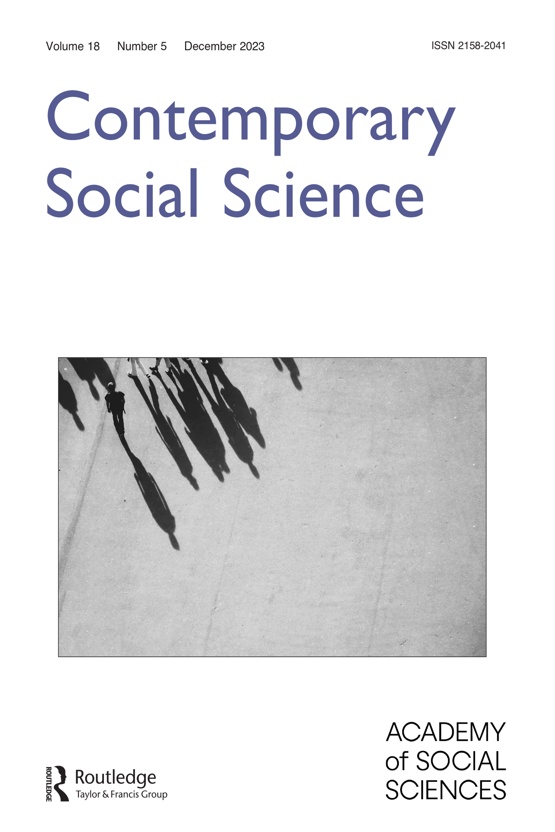Submit a Manuscript to the Journal
Contemporary Social Science
For a Special Issue on
Ten Years on: the UK and EU ten years after the Referendum
Manuscript deadline

Special Issue Editor(s)
David Bailey,
Birmingham Business School, University of Birmingham
d.g.bailey@bham.ac.uk
Ten Years on: the UK and EU ten years after the Referendum
The vote to leave the European Union in 2016 marked a rupture in the politics and economics of the UK, and of course in its relations with the EU. Ten years on, Brexit might be ‘done,’ but its political, economic and social reverberations continue. If ‘taking back control’ was meant to bring an opportunity to do things differently across a range of policy areas, post-Brexit reality is a mixed picture. There has been no ‘big bang’ of divergence. Some choices have indeed been made (think of immigration policy) while in other cases the UK has struggled on policy development (think of agricultural policy). And where the UK has started to diverge from EU policy, the implications will take years to unfold.
Relations between the UK and EU began to improve under Prime Minister Sunak (as seen in the Windsor Agreement) and most recently the UK-EU Summit under the Starmer government saw a further rapprochement even though the Starmer government’s red lines meant no rejoining of the Single Market or Customs Union, and therefore no chance for a big boost to the UK’s lacklustre growth. While welcome, the Summit’s outcomes were broad but not deep, leaving everything except fish still to be negotiated, on a range of issues across defence and security, energy, emissions trading, youth experience, Erasmus, and SPS. The Summit at least saw a belated recognition by the UK of the reality of trade-offs post Brexit.
This special collection seeks to explore evolving UK-EU relations, and how Brexit has impacted.in terms of people, places and policies and across different sectors. Post Brexit the UK has put in place new policies in areas such as trade and immigration, while in other areas the UK kept large chunks of EU ‘retained law’ but has begun thinking about diverging in some areas (such as financial services) or integrating with the EU where the latter allows ‘cherry picking’ (food for example). Meanwhile impacts across sectors and regions are playing out differently.
Submissions are invited to this special collection of Contemporary Social Science on the multi-dimensional nature of ‘Ten Years on.’ We encourage the submissions of original articles, both theoretical and empirical, as well as shorter Comment pieces, which investigate and analyse from single disciplinary and multi-disciplinary perspectives on the following, but not exhaustive, topics:
The Starmer government’s EU policy
The state of UK – EU relations after the ‘Reset’
UK-EU foreign, security and defence cooperation
Public Opinion and Brexit
Brexit and political parties
The UK’s Trade Strategy and implications for relations with the EU
The economic impacts of Brexit
Regulating after Brexit and regulatory relations with the EU: Divergence, Replication and/or Integration?
Industrial Strategy
Regional Policy beyond ‘levelling Up’
The Devolved administrations ten years on
Industrial and sectoral impacts
Agriculture and Fisheries
Financial services
Agriculture, food and fisheries
Migration and Mobility
Environment and Climate Change, including Emissions Trading and the Carbon Border Adjustment Mechanism
Social policy and welfare reform
Digital, Data and IP
Education and Research
The State of the UK Union
Brexit and the Constitution, Parliament and the Civil Service
Brexit and the machinery of government
Submission Instructions
The Guest Editors welcome submissions now.
For full instructions on submitting to the journal please see the Instructions for Authors page here: https://www.tandfonline.com/action/authorSubmission?show=instructions&journalCode=rsoc21
Authors should indicate that they wish the manuscript to be reviewed for inclusion in the special collection. The Editors of this issue would be happy to review plans for papers in advance of their receipt.
All papers will be peer reviewed.
The closing date for submitting papers is 28th February 2026, with the aim of publishing papers in 2026.
Manuscripts should follow the journal instructions for online submission of papers.
For any queries please contact the guest editor: d.g.bailey@bham.ac.uk

